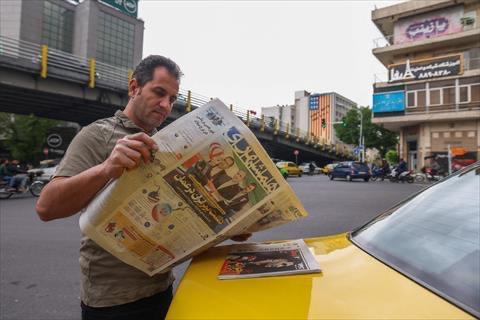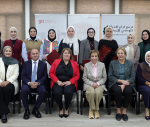You are here
Iran delegation in Oman for high-stakes nuclear talks with US
Apr 12,2025 - Last updated at Apr 12,2025

An Iranian man reads a newspaper on a Tehran street on April 12, 2025, with the front page featuring the Iran-US talks on the Iranian nuclear programme set to begin in Oman on the same day (AFP photo)
MUSCAT, Oman — The United States wants a nuclear agreement "as soon as possible", Iran said after rare talks on Saturday, as US President Donald Trump threatens military action if they fail to reach a deal.
Foreign Minister Abbas Araghchi, who briefly spoke face-to-face with Trump's special envoy Steve Witkoff during the indirect meeting in Oman, said the talks would resume next Saturday.
"The American side also said that a positive agreement was one that can be reached as soon as possible but that will not be easy and will require a willingness on both sides," Araghchi told Iranian state television.
"At today's meeting, I think we came very close to a basis for negotiation... Neither we nor the other party want fruitless negotiations, discussions for discussions' sake, time wasting or talks that drag on for ever," he added.
Oman's foreign minister acted as intermediary in the talks in Muscat, Iran said. The Americans had called for the meetings to be face-to-face.
However, the negotiators also spoke directly for "a few minutes", Iran's foreign ministry said. It said the talks were held "in a constructive and mutually respectful atmosphere".
The long-term adversaries, who have not had diplomatic relations for more than 40 years, are seeking a new nuclear deal after Trump pulled out of an earlier agreement during his first term in 2018.
Araghchi, a seasoned diplomat and key architect of the 2015 accord, and Witkoff, a real estate magnate, led the delegations in the highest-level Iran-US nuclear talks since the previous accord's collapse.
The two parties were in "separate halls" and were "conveying their views and positions to each other through the Omani foreign minister", Iran's foreign ministry spokesman Esmaeil Baqaei posted on X.
The process took place in a "friendly atmosphere", Omani Foreign Minister Badr Albusaidi said.
Iran, weakened by Israel's pummelling of its allies Hezbollah in Lebanon and Hamas in Gaza, is seeking relief from wide-ranging sanctions hobbling its economy.
Tehran has agreed to the meetings despite baulking at Trump's "maximum pressure" campaign of ramping up sanctions and repeated military threats.
Meanwhile the US, hand-in-glove with Iran's arch-enemy Israel, wants to stop Tehran from ever getting close to developing a nuclear bomb.
Witkoff open to 'compromise'
There were no visible signs of the high-level meeting at a luxury hotel in Muscat, the same venue where the 2015 agreement was struck when Barack Obama was US president.
Witkoff told The Wall Street Journal earlier that the US position starts with demanding that Iran completely dismantle its nuclear programme -- a view held by hardliners around Trump that few expect Iran to accept.
"That doesn't mean, by the way, that at the margin we're not going to find other ways to find compromise between the two countries," Witkoff told the newspaper.
"Where our red line will be, there can't be weaponisation of your nuclear capability," he added.
The talks were revealed in a surprise announcement by Trump during a White House appearance with Israeli prime minister Benjamin Netanyahu on Monday.
Hours before they began, Trump told reporters aboard Air Force One: "I want Iran to be a wonderful, great, happy country. But they can't have a nuclear weapon."
Supreme leader Ayatollah Ali Khamenei's adviser Ali Shamkhani said Iran was "seeking a real and fair agreement".
Saturday's meetings followed repeated threats of military action by both the US and Israel.
"If it requires military, we're going to have military," Trump said on Wednesday when asked what would happen if the talks fail.
'Survival of the regime'
The 2015 deal that Trump abandoned aimed to make it practically impossible for Iran to build an atomic bomb, while at the same time allowing it to pursue a civil nuclear programme.
Iran, which insists its nuclear programme is only for civilian purposes, stepped up its activities after Trump withdrew from the agreement.
The latest International Atomic Energy Agency said Iran had an estimated 274.8 kilograms of uranium enriched to 60 percent, nearing the weapons grade of 90 percent.
Karim Bitar, a Middle East Studies lecturer at Sciences Po university in Paris, said the Iranian government's very survival could be at stake.
"The one and only priority is the survival of the regime, and ideally, to get some oxygen, some sanctions relief, to get their economy going again, because the regime has become quite unpopular," he told AFP.















